20 Superfoods You Should Be Eating Every Day

Enjoying a healthy, nutritious, and satiating diet doesn't have to be complicated. "When you eat a more natural, less processed diet you will see positive effects on your physical and emotional health," says Nebraska Methodist Health System. "A healthy diet will not only reduce the risk of chronic diseases, but also will improve your mood and overall quality of life." So which foods should you be eating every day? Here are 20 superfoods that not only taste delicious but are beneficial for your health.
Eggs

Eggs are full of healthy fats and choline, plus they are versatile and easily accessible for most people. "While it's true that just one large egg yolk has 200 mg of cholesterol—making it one of the richest sources of dietary cholesterol—eggs also contain additional nutrients that may help lower the risk for heart disease," says Harvard Health.
Avocados
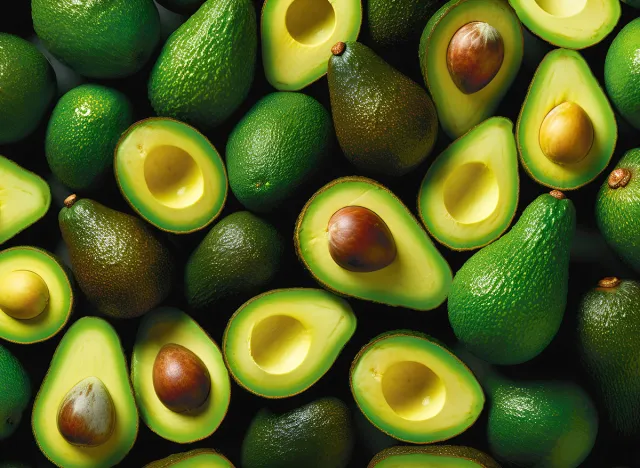
Just one avocado has more potassium than a banana. "Avocados are a bit pricey in most states, but worth it—after all, they're packed with healthy fats, folate, vitamin C, and vitamin K," says Select Health. "Turn avocados into guacamole, put them on toast, or just put some Himalayan pink salt on them and eat them whole."
Salmon
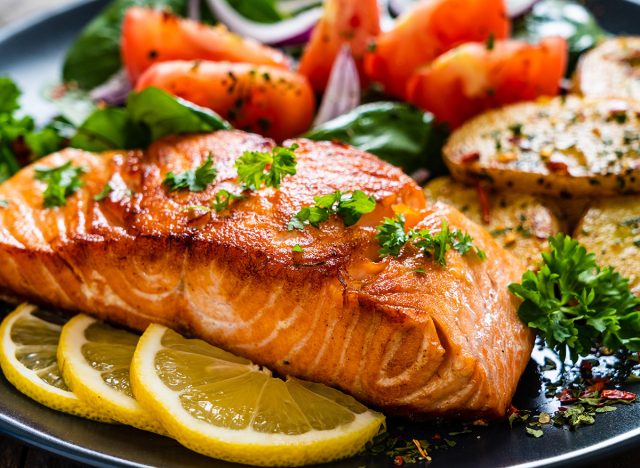
Oily fish such as salmon and mackerel are hugely beneficial for health. "Besides omega-3 fatty acids, it has protein, B vitamins, potassium, selenium, and antioxidants," says Select Health. "Try a poke bowl and fall in love with this body-friendly fish."
Walnuts
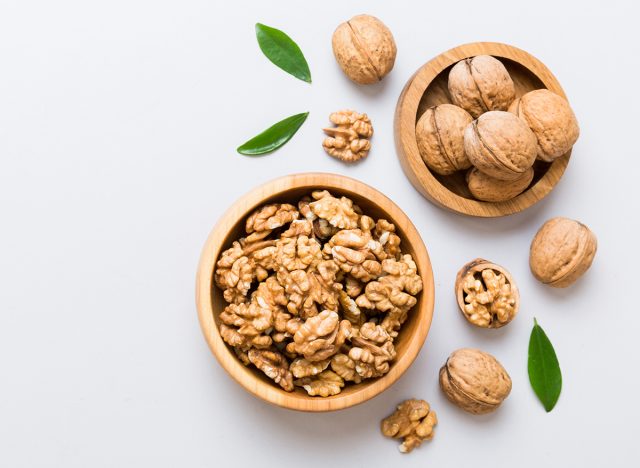
Walnuts contain iron and magnesium and are best enjoyed raw. "Walnuts are a great source of alpha-linolenic acid (ALA), an omega-3 fatty acid that is important for reducing inflammation. In fact, it is the only nut significantly high in these omega-3 fatty acids," according to UC Davis Health. "Their anti-inflammatory compounds may reduce the risk of heart disease."
Arugula
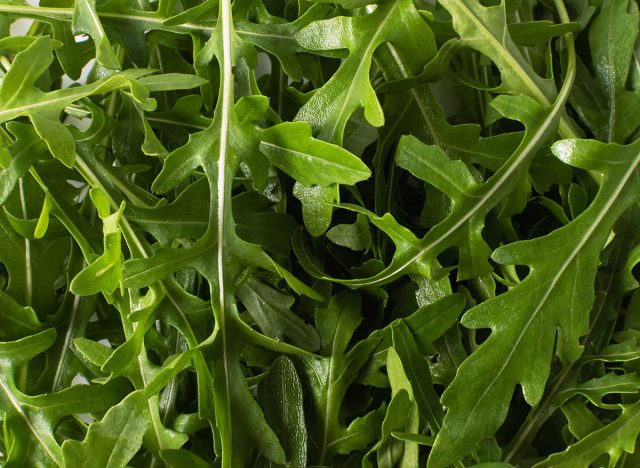
Spicy, peppery arugula elevates so many dishes and is very good for your health. "Similar to kale, arugula is a cruciferous vegetable. Brussels sprouts, broccoli, and cauliflower are also part of this family, and adding veggies like leafy greens provides the body with a variety of vitamins, phytochemicals, and antioxidants that can support an athlete in their recovery process," Yasi Ansari, MS, RDN, CSSD, tells Runner's World.
Broccoli
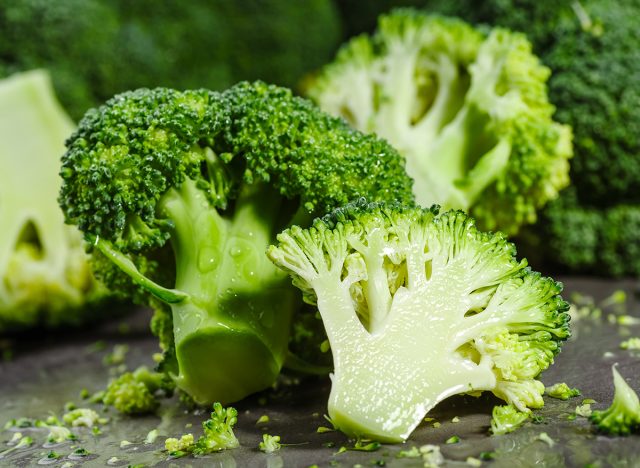
"Broccoli's anti-inflammatory, antioxidant, and fiber-rich properties support heart health," says the National Institutes of Health. "It can help lower cholesterol, maintain proper blood pressure, and promote cardiovascular health."
RELATED: The Ultimate Guide to Getting Fit as a Pear Body Type
Blueberries
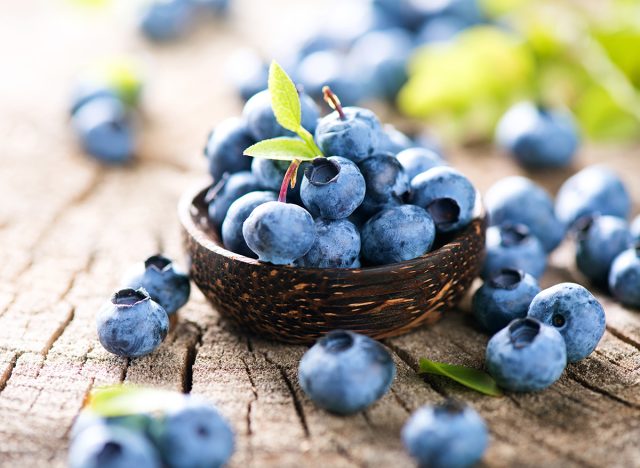
Packed full of vitamin C and heart-healthy anthocyanins, blueberries pack a serious nutritional punch. "Beyond their tangy sweetness, blueberries offer a wealth of health benefits," dietician Anya Miller tells the Mayo Clinic. "Blueberries, in particular, have about 25 different anthocyanins, whereas other berries might just have two or three."
Cinnamon
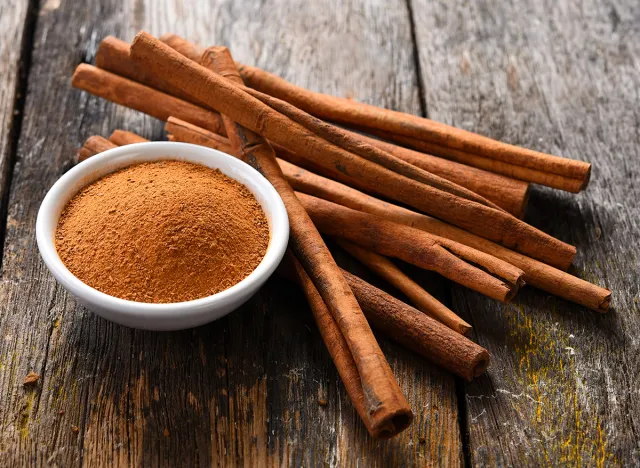
Cinnamon—specifically the Ceylon type—is packed with nutrients that improve heart health and blood sugar. "Not only is cinnamon delicious, but it's also loaded with antioxidants, helps cut down inflammation, and helps improve sensitivity to insulin," says Select Health.
Brussels Sprouts
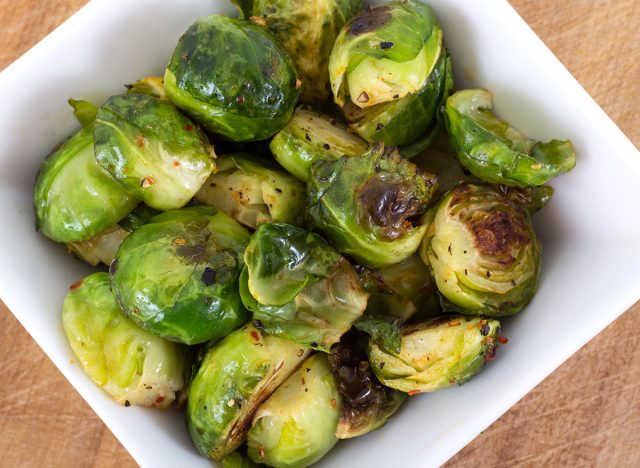
The sulforaphane in Brussels sprouts makes it a superfood. "Sulforaphane has been shown to reduce the ability of cancerous cells to multiply," says MD Anderson Cancer Center. "That means it may slow tumor growth or reduce its ability to spread to other parts of your body."
Strawberries
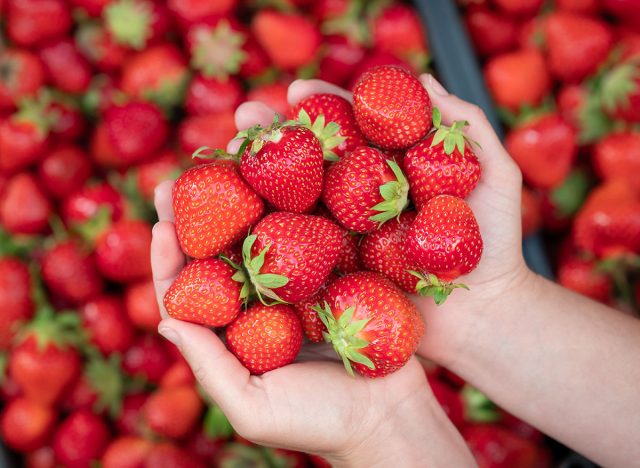
Strawberries are low in sugar and high in nutrients. "When it comes to foods that both taste great and are great for your heart, it's hard to beat the berry," says Johns Hopkins Medicine. "Berries of all kinds are rich in antioxidants — substances found in certain foods that help fight cell damage."
RELATED: 15 Quick Ways to Lose Body Fat Percentage in a Week
Spinach
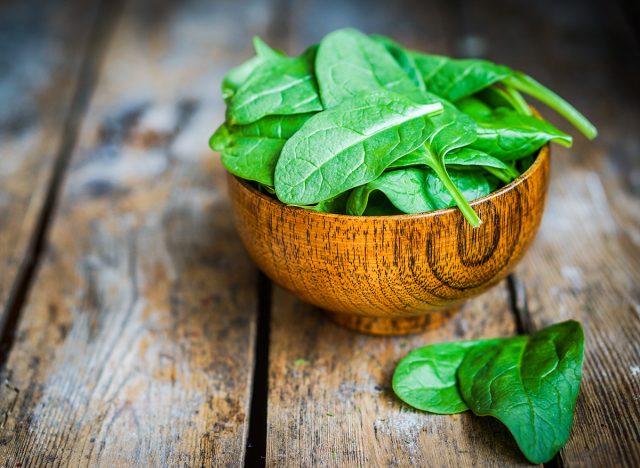
Low in calories and high in nutrients, spinach is a superfood. "Spinach is one of the most nutritious foods you can eat," registered dietitian Kayla Kopp, RD, LD, tells the Cleveland Clinic. "It's also very easy to use. Raw or cooked, spinach is great in salads, appetizers, smoothies, and main dishes."
Almonds
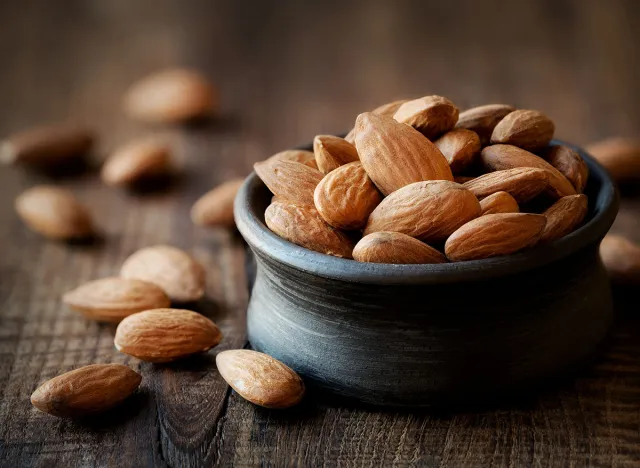
Almonds are low in carbs and high in healthy fats, calcium, and antioxidants. "Interestingly, despite nuts being calorie-dense, research does not support a link with nut intake and weight gain," according to Harvard T.H. Chan School of Public Health. "In fact, they have been associated with less weight gain and a lower risk of obesity, possibly because the fat and fiber content help to improve feelings of satisfaction and fullness."
Olives
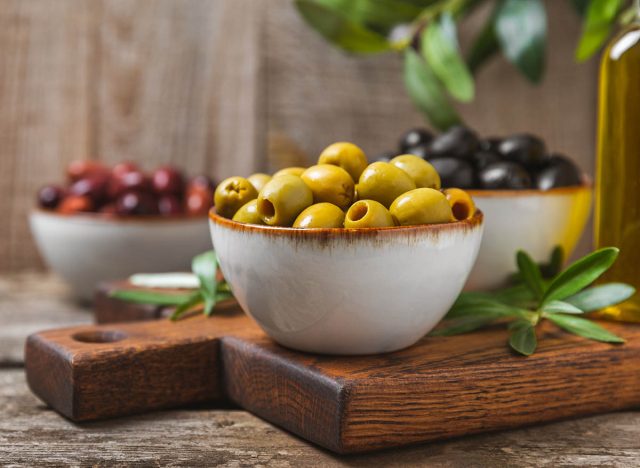
Olives are packed full of healthy fats. "Olives are a nutritional powerhouse," says the Cleveland Clinic. "Although they're composed mostly of fat, it's monounsaturated fat, the type known for having health benefits."
Sweet Potato
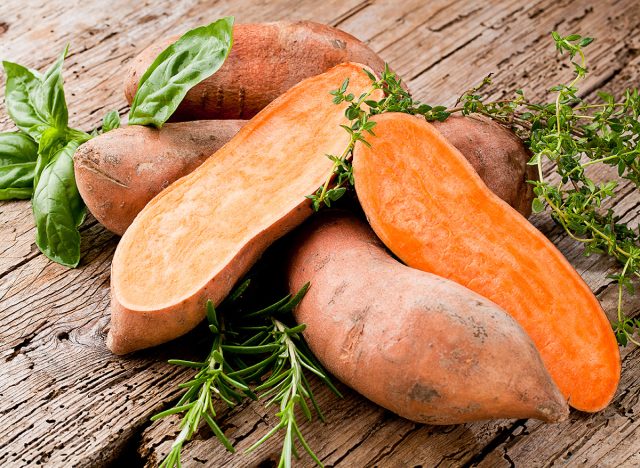
Sweet potatoes are full of nutrients such as potassium. "Sweet potatoes also provide vitamin B6 and vitamin C, which have powerful health benefits," says UPMC HealthBeat. "Vitamin B6 bolsters brain development in children and brain function in adults. B6 also helps the body produce serotonin, a hormone that regulates mood and helps you cope with stress. Vitamin C is an antioxidant that protects your cells from free radicals."
RELATED: This Plan Is How to Lose 5 Percent Body Fat In 2 Weeks
Garlic
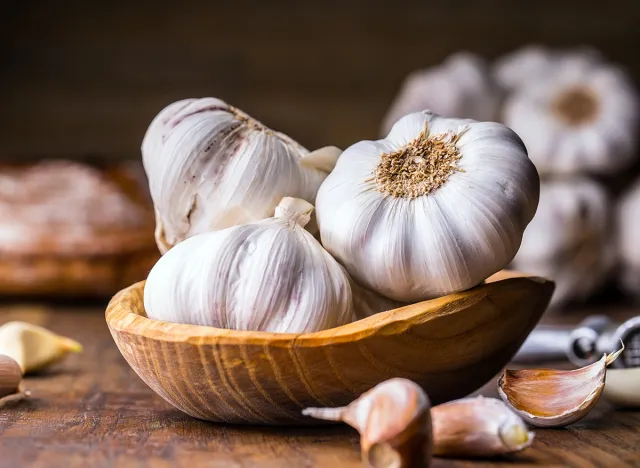
Experts say raw garlic is better than cooked, but the best for health is fermented garlic. "This flavorful veggie is known to boost immunity, work as an anti-inflammatory, improve cardiovascular health, and more — not to mention, it adds a tasty kick to just about any dish," says the Cleveland Clinic.
Leafy Greens
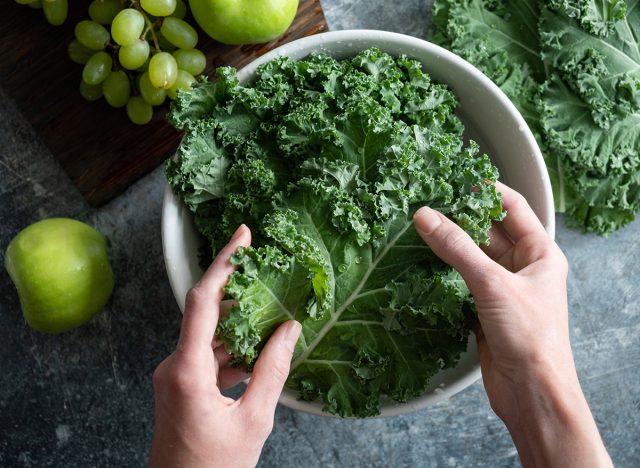
"Dark, leafy greens are a good source of vitamin A, vitamin C, and calcium, as well as several phytochemicals (chemicals made by plants that have a positive effect on your health)," says Harvard Health. "They also add fiber into the diet."
Greek Yogurt
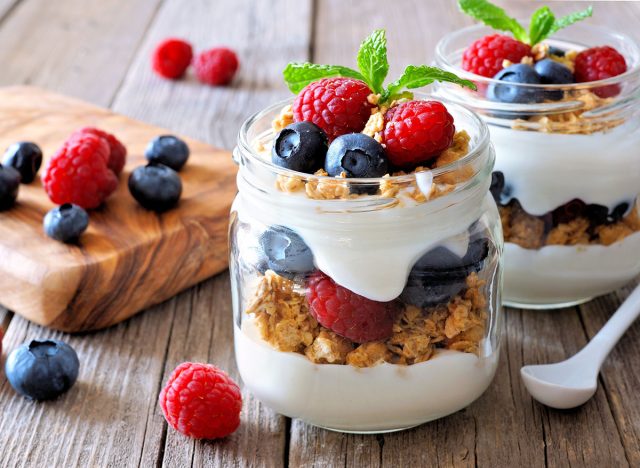
High in protein and vitamin B12, Greek yogurt is an excellent snack. "Greek yogurt is high in protein, which helps promote fullness," according to UT Medical Center. "A typical 6-ounce serving contains 15 to 20 grams, the amount in 2 to 3 ounces of lean meat."
Whole Grains
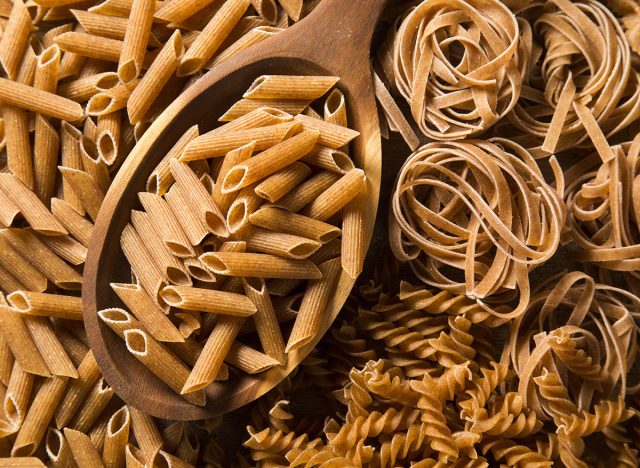
Whole grains have plenty of fiber and nutrients. "Whole-grain foods help control cholesterol levels, weight, and blood pressure," says the Mayo Clinic. "These foods also help lower the risk of diabetes, heart disease, and other conditions."
Pecans
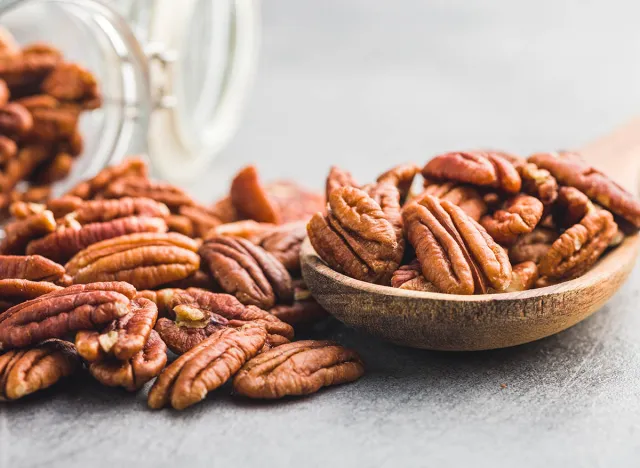
Pecans are full of healthy fats, protein, and fiber. "Almonds, macadamia nuts, hazelnuts and pecans also appear to be quite heart healthy," says the Mayo Clinic. "So are peanuts — though they are technically not a nut, but a legume, like beans."
RELATED: Benchmark Your Progress with Our Lean Body Mass Calculator
Olive Oil
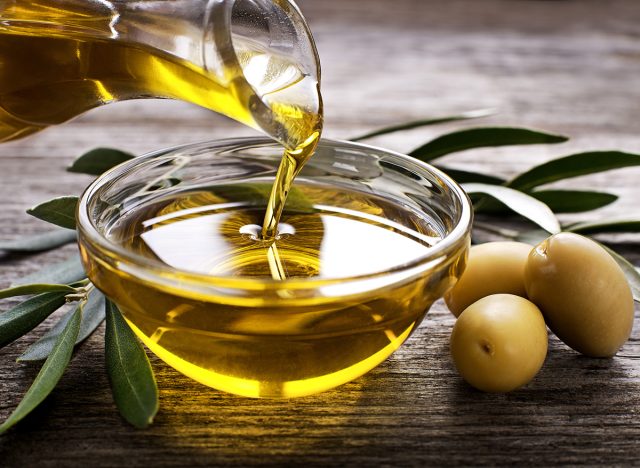
Olive oil is full of healthy fats and a staple part of the Mediterranean diet. "We know that there are quite a lot of health benefits to extra virgin olive oil, in particular," registered dietitian Julia Zumpano, RD, LD, tells the Cleveland Clinic. "It has been shown to have antioxidants and anti-inflammatory properties, specifically from the types of fat it has."
💪🔥Body Booster: Try the Mediterranean diet. It's a perfect example of a superfood-packed diet. And if you enjoyed this article, take advantage of these 20 Superfoods for People Over 50.




